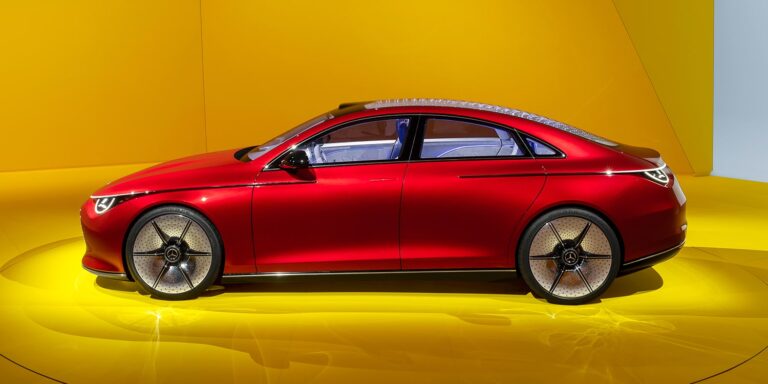According to a Chinese media report, Mercedes-Benz will use battery cells from BYD in the production version of its all-electric CLA. The Stuttgart company presented the model as a concept at the IAA Mobility, and it is due to make its market debut next year.
The official magazine of the China Automotive Battery Research Institute (CABRI), CBEA, reported on the integration of BYD battery cells, citing sources from Mercedes-Benz. Specifically, BYD’s LFP battery cells are to be used in the electric CLA. This coincides with statements made by Mercedes-Benz when presenting the concept, according to which cells with LFP chemistry will be used in the entry-level version. In Munich, however, the Stuttgart company did not name a specific supplier.
The electric CLA is supposed to provide a preview of the coming vehicle family based on the Mercedes-Benz Modular Architecture (MMA). This is a newly developed 800-volt platform for the smaller Mercedes models. The development was based on the “Electric First” principle: The MMA was designed and optimised for electric drive systems, but can still accommodate combustion engines.
The new, self-developed powertrain is directly derived from the electric drive of the Vision EQXX and consists of an 800-volt architecture in combination “with a battery with a particularly high energy density and a very efficient electric drive unit”, as it was said in Munich a few days ago. Mercedes-Benz claims an energy consumption of only 12 kWh per 100 kilometres and an expected WLTP range of more than 750 kilometres for the Concept CLA Class. However, LFP batteries are only used in the entry-level model, the top variant is supposed to have anodes with silicon oxide content for a particularly high energy density – Mercedes did not provide any information on the cathode.
CBEA magazine now reports that Mercedes-Benz will purchase the Blade battery from BYD to cover the LFP models. The Blade battery is an LFP cell with a special form factor: the cells are very long, which makes them resemble the blade of a sword. The blade battery is a cell-to-pack technology: the cells are directly installed in the battery pack and not first grouped in individual modules. This allows the energy density to be increased at the pack level. BYD uses the blade batteries in its own models, but also markets them to third parties. For example, the Chinese manufacturer supplies Tesla’s Berlin plant with blade batteries. The Toyota bz3 and the Kia EV5 will also feature blade batteries from BYD.
While Mercedes-Benz is now said to be the next customer, according to CBEA, it is apparently not yet clear whether the Stuttgart-based company will only use the Blade battery for production in China or also for the international version.
Mercedes-Benz and BYD know each other well. In 2010, Mercedec-Benz (then Daimler) founded the joint venture Denza with BYD, but withdrew heavily in December 2021 and has held only ten per cent since then.
cbea.com (in Chinese) via carnewschina.com



